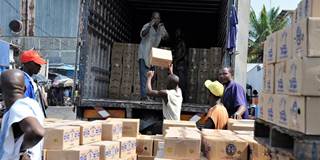Africa, like other developing regions around the world, has persistently low levels of intraregional trade, owing to poor infrastructure and trade barriers maintained by the African Union’s 55 member states. The Continental Free Trade Agreement promises to change that, but only if African leaders can agree on the details.
KAMPALA – US President Donald Trump’s “America First” trade policies have triggered a global bout of tit-for-tat protectionism that could precipitate a meltdown of the international trading system. Against this backdrop of growing tensions involving the United States, China, the European Union, and other major economies, Africa may seem like a passive bystander. But looks can be deceiving.
At a conference on March 21 in Kigali, Rwanda, 44 African countries took a major step toward establishing a vast single market that promises to strengthen all of the continent’s economies. By signing on to the African Continental Free Trade Area (CFTA), African leaders have signaled their commitment to modernization within the postwar international system of rules-based trade.
Some commentators were quick to respond to the CFTA agreement with the same old narrative about Africa, offering hackneyed arguments for why a free-trade area will never work. They paraded out the usual suspects: inadequate infrastructure, low levels of industrialization, the continent’s poor track record of implementing past agreements, the high cost of doing business, and endemic corruption.

KAMPALA – US President Donald Trump’s “America First” trade policies have triggered a global bout of tit-for-tat protectionism that could precipitate a meltdown of the international trading system. Against this backdrop of growing tensions involving the United States, China, the European Union, and other major economies, Africa may seem like a passive bystander. But looks can be deceiving.
At a conference on March 21 in Kigali, Rwanda, 44 African countries took a major step toward establishing a vast single market that promises to strengthen all of the continent’s economies. By signing on to the African Continental Free Trade Area (CFTA), African leaders have signaled their commitment to modernization within the postwar international system of rules-based trade.
Some commentators were quick to respond to the CFTA agreement with the same old narrative about Africa, offering hackneyed arguments for why a free-trade area will never work. They paraded out the usual suspects: inadequate infrastructure, low levels of industrialization, the continent’s poor track record of implementing past agreements, the high cost of doing business, and endemic corruption.